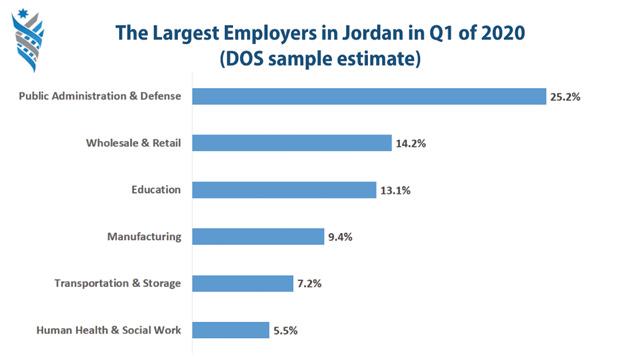You are here
JSF paper throws light on tele-workable occupations in Jordan
By JT - Oct 28,2020 - Last updated at Oct 28,2020

Graph courtesy of JSF
AMMAN — COVID-19 has forced Jordanians to adapt to a “new normal” as the lockdown has introduced the government, private sector entities, as well as the average working Jordanian to the concept of “working from home”.
Within this context, speculation was raised regarding who can manage to work remotely, and what professions require in-person operations, the Jordan Strategy Forum (JSF) said in a “nutshell” paper.
Several international studies have shown that 37 per cent-50 per cent of the jobs in the Organisation for Economic Co-operation and Development (OECD) countries can be done remotely.
Based on expert opinion surveys, as well as previous studies by the International Labour Organisation (ILO), a study by the University of Chicago, Booth School of Business, NBER, and CEPR (May 2020) has identified every tele-workable job according to the ISCO-ILO classification of occupations.
The study indicates that the top three most tele-workable jobs are in computer and software development (100 per cent), education, training and library occupations (85 per cent-98 per cent), and in legal occupations (84 per cent-97 per cent).
The least tele-workable jobs (at 0 per cent) are in building and grounds cleaning and maintenance occupations, food preparation and serving related occupations, and in construction and extraction occupations.
“If we use the University of Chicago’s results and the labour market distribution in Jordan, we can roughly estimate the overall proportion of working Jordanians who can work remotely,” the JSF said.
“For example, the fact that the education sector accounts for about 13 per cent of the employed and 98 per cent of these individuals can work remotely [noting that there is a difference in the nature instruction methods in education between various countries], we can state that 12.7 per cent [0.98 X 0.13] of Jordanians can work from home. Based on this methodology, we estimate that 20.5 per cent of employed Jordanians can work remotely,” it added.
In a nutshell
The implication of this relatively low proportion is that a full lockdown can severely harm the Jordanian labour market — 79.5 per cent are not able to telework.
This calls for incentivising automation and digitalisation of the economy.
The private sector should have a clear strategy for the rapid transformation of remote work to protect the health and professional safety of its employees if and when, an epidemic occurs in the future.
The JSF urges companies to evaluate the efficiency and productive capacity of their employees before and after the transition to remote work.
This should facilitate the identification and treatment of any organisational and logistical gaps in their operations, particularly when it comes to reducing futile extra working hours (“hidden overtime”). Such a strategy would also contribute to greater flexibility in the labour market and hence, higher productivity, the JSF said.
Finally, the relatively high proportion of those who cannot telework, and their respective sectors, should help the government in identifying the most vulnerable groups in Jordan who may be in dire need for financial support, should a lockdown take place, according to the JSF.
Related Articles
AMMAN — The Jordan Strategy Forum (JSF) anticipates that the unemployment rate among engineers in the Kingdom will probably increase if the
AMMAN — While the number of women working in banks across the Kingdom has improved to reach 35 per cent, female participation in corporate g
AMMAN — The growth rate of labour productivity in Jordan has been negative since 2010, the Jordan Strategy Forum (JSF) said on Saturday.In a
















